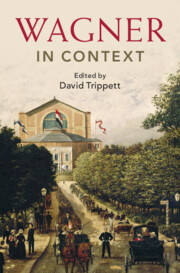Book contents
- Wagner in Context
- Composers in Context
- Wagner in Context
- Copyright page
- Contents
- Illustrations
- Musical Examples
- Contributors
- Acknowledgements
- Abbreviations
- Introduction
- I Place
- Chapter 1 Paris
- Chapter 2 Dresden
- Chapter 3 Zurich and Lucerne
- Chapter 4 Italy
- Chapter 5 London
- Chapter 6 Bayreuth as City: A Wagnerian Chronology
- Chapter 7 America
- Chapter 8 Spain in the Cosmos of Richard Wagner
- II People
- III Politics, Ideas, and Bodies
- IV Life, Language, and the Ancient World
- V Music and Performance
- VI Reception
- Further Reading
- Select Bibliography
- Index
Chapter 6 - Bayreuth as City: A Wagnerian Chronology
from I - Place
Published online by Cambridge University Press: 14 March 2024
- Wagner in Context
- Composers in Context
- Wagner in Context
- Copyright page
- Contents
- Illustrations
- Musical Examples
- Contributors
- Acknowledgements
- Abbreviations
- Introduction
- I Place
- Chapter 1 Paris
- Chapter 2 Dresden
- Chapter 3 Zurich and Lucerne
- Chapter 4 Italy
- Chapter 5 London
- Chapter 6 Bayreuth as City: A Wagnerian Chronology
- Chapter 7 America
- Chapter 8 Spain in the Cosmos of Richard Wagner
- II People
- III Politics, Ideas, and Bodies
- IV Life, Language, and the Ancient World
- V Music and Performance
- VI Reception
- Further Reading
- Select Bibliography
- Index
Summary
First mentioned in 1194, Bayreuth became the centre of the rule of the Margraves of Andechs-Merania. The city reached its Baroque heyday in the mid-eighteenth century under the regency of Margraves Friedrich and Wilhelmine, a sister of Friedrich II of Prussia (‘the Great’). After the loss of the margravial residence in 1769 and as a result of the Napoleonic Empire, the city lost its former importance and passes from Prussian to Bavarian rule. The poet Jean Paul (actually Johann Paul Friedrich Richter) lived in Bayreuth from 1804 until his death in 1825. With Richard Wagner’s move to Bayreuth in 1872, the construction of the Festspielhaus, and the founding of the Bayreuth Festival in 1876, the city in the Franconian province becomes the epitome of German culture with international significance and impact – but also a symbol of the ideological claim to Wagner by National Socialism and the Wagnerian Adolf Hitler.
- Type
- Chapter
- Information
- Wagner in Context , pp. 58 - 67Publisher: Cambridge University PressPrint publication year: 2024

